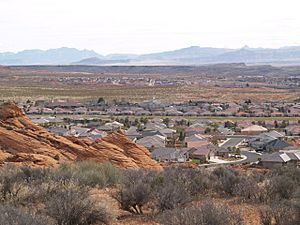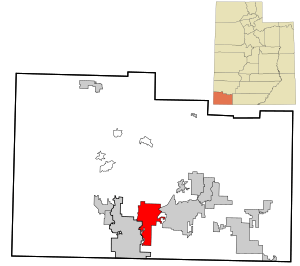Washington, Utah facts for kids
Quick facts for kids
Washington, Utah
|
|
|---|---|
 |
|

Location in Washington County and the state of Utah
|
|
| Country | |
| State | |
| County | Washington |
| Settled | 1857 |
| Named for | George Washington |
| Area | |
| • Total | 34.79 sq mi (90.09 km2) |
| • Land | 34.79 sq mi (90.09 km2) |
| • Water | 0.00 sq mi (0.00 km2) |
| Elevation | 2,894 ft (882 m) |
| Population
(2020)
|
|
| • Total | 27,993 |
| • Density | 838.67/sq mi (323.82/km2) |
| Time zone | UTC-7 (Mountain (MST)) |
| • Summer (DST) | UTC-6 (MDT) |
| ZIP code |
84780
|
| Area code(s) | 435 |
| FIPS code | 49-81960 |
| GNIS feature ID | 2412187 |
Washington is a city in Washington County, Utah, in the United States. It is part of the larger St. George Metropolitan Area.
This area is sometimes called "Utah's Dixie". This nickname came about because early settlers, known as Mormon pioneers, tried to grow cotton here. They even had a cotton mill in Washington. In 2020, the city had a population of 27,993 people. Washington is growing quickly and is the second-largest city in Washington County.
The city was named after George Washington, who was the first President of the United States. City leaders have recently encouraged people to use the name "Washington City."
Contents
History of Washington City
The Church of Jesus Christ of Latter-Day Saints sent 28 families to this area. Their goal was to try and grow cotton. This effort was known as the "cotton mission." Some of the first settlers came from the southeastern United States. The area was nicknamed Utah's Dixie, similar to the nickname for the southeastern states.
Geography of Washington, Utah
Washington City covers about 32.5 square miles (85.2 square kilometers). Most of this area is land. Only a very small part, about 0.07 square miles (0.1 square kilometers), is water.
Population and People
| Historical population | |||
|---|---|---|---|
| Census | Pop. | %± | |
| 1860 | 196 | — | |
| 1870 | 463 | 136.2% | |
| 1880 | 483 | 4.3% | |
| 1890 | 315 | −34.8% | |
| 1900 | 529 | 67.9% | |
| 1910 | 424 | −19.8% | |
| 1920 | 464 | 9.4% | |
| 1930 | 435 | −6.2% | |
| 1940 | 507 | 16.6% | |
| 1950 | 435 | −14.2% | |
| 1960 | 445 | 2.3% | |
| 1970 | 750 | 68.5% | |
| 1980 | 3,092 | 312.3% | |
| 1990 | 4,198 | 35.8% | |
| 2000 | 8,186 | 95.0% | |
| 2010 | 18,761 | 129.2% | |
| 2020 | 27,993 | 49.2% | |
| U.S. Decennial Census | |||
In 2000, there were 8,186 people living in Washington City. There were 2,614 households and 2,117 families. The population density was about 259.7 people per square mile.
Most people in the city were White (94.31%). Other groups included Native American (1.71%) and African American (0.37%). About 4.69% of the population was Hispanic or Latino.
About 36.3% of households had children under 18 living with them. Many households (71.4%) were married couples. The average household had 3.00 people.
The city's population was spread out by age. About 30.1% were under 18 years old. The median age was 32 years. This means half the people were younger than 32 and half were older.
Education in Washington City
Students in Washington City attend schools within the Washington County School District.
High Schools Serving Washington City
- Pine View High School: Many students from Washington City attend this school. It is located just outside the city in St. George.
- Crimson Cliffs High School: This school also serves parts of Washington City and St. George.
- St George Academy: This is a charter high school located in Washington City. It helps students prepare for college.
See also
 In Spanish: Washington (Utah) para niños
In Spanish: Washington (Utah) para niños
 | Precious Adams |
 | Lauren Anderson |
 | Janet Collins |

